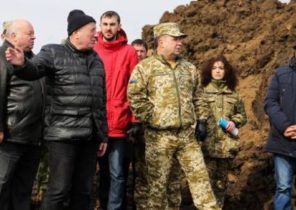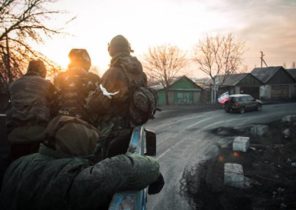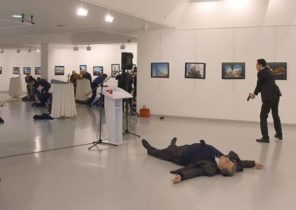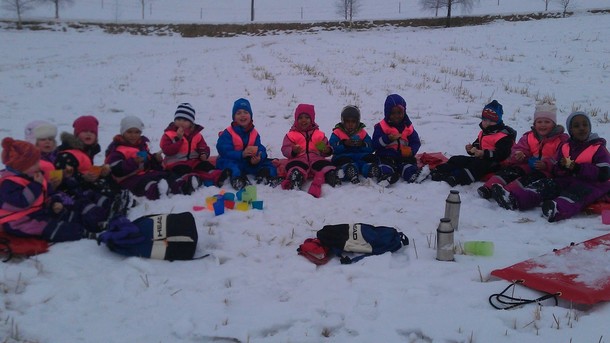
We like to blame pre-school education: that educators and inattentive, and bad food, and teach the children right and wrong. But it turns out that in some wealthy countries with kindergartens is not so rosy. So, in England, children can eat cold food in Germany almost the whole day to themselves, in France, walking across the room in street shoes, and parents are not allowed even on the threshold of the garden. But, of course, there are times that you can borrow — for example, “tours” around the city and sleep in the fresh air.
FRANCE: PARENTS NOT ALLOWED EVEN ON THE THRESHOLD
Maternity leave in France just 3 months after giving birth. Because there are nurseries accepting such crumbs. A group of 14 children up to 3 years accounted for as much as 7 adults: caregivers, nurses, nurses sometimes come to help parents. There is an option to give the baby to a nurse — a specially trained and accredited pros (she looks no more than 4 children).
The average cost of stay of the child in a private kindergarten — 300 euros per month, municipal — about 150 euros. With three years of free kindergartens: parents only pay for the lunch and the extra time children spend here while they are at work. But the state allocates aid, depending on the annual income of the parents, and pays a small payment to the child. Also at the end of the financial year can be deducted up to 1000 euros tax paid for this period. Children in kindergarten lead with 8:00 to 8:40 and take — up to 15.40. Wednesdays — closed. Interestingly, the gardens, and schools also closed for the holidays, and dates are determined by the region where is located the kindergarten.
Catherine Androshchuk, living in France, told how the local life is a little more complex after a series of attacks: “Parents have no right even to cross the threshold of the garden (and schools also)! I at first was very shocking, like the fact that there is no such thing as shoes. That is, the child in the garden, walks in the shoes or boots that walks on the street, and it does not bother anyone”.

Unusual. In the gardens children are not pereobuvatsya in shoes.
NORWAY: SLEEP UNDER THE SKY AND “TOURS”
Maternity leave in this country — the 49 weeks (almost 10 months). Of these, 10 weeks (they are fully paid for) it sure is dad. It is very useful for baby, and for dad, especially for mom. Daddy after this immersion in fatherhood you begin to understand how difficult it is to raise children, not afraid to take on responsibilities, in the end, mom is able to rest. Wins the whole family.
The former inhabitant of Kiev Ales lives in Norway with her daughter Mary. In the garden, Mary went to 1 year and a month, and she is now a year and a half. “The gardens here are private and public. Price hassadeh is formed like this: base cost (now 2730 Krohn — 8900 UAH) is paid for plus food and educational classes, — says Ales. In private the price of an average 2 times higher than in private, and may vary depending on the nutrition situation. Some parents collect child a slo-mo. Some feed three times a day: twice sandwiches, fruit, milk and one hot meal. It is very attentive to food preferences. For example, parents are asked to indicate the products to which the child has an Allergy”.
According to Alesya, children in Norway walk in any weather, and babies up to 3 years to be put to sleep outdoors in prams in winter. Parents are asked to purchase a special sleeping bag. Senior, 3-6 years, in the group sleeping on the floor, on special mats. Once a week children carry a “tour”: in the library. For this purpose, for kids there is a special trolley.
“I was impressed by the attitude of teachers to children. Especially to those who are just getting used to the kindergarten, — says Ales. — Child can have hours to be on hand until he calms down or not going back mother. My baby is very tame, but in the garden so carefully treated her, that now she goes there with great pleasure! Usually 24 children and 4-5 teachers. That is one adult looking after 5 children maximum.”
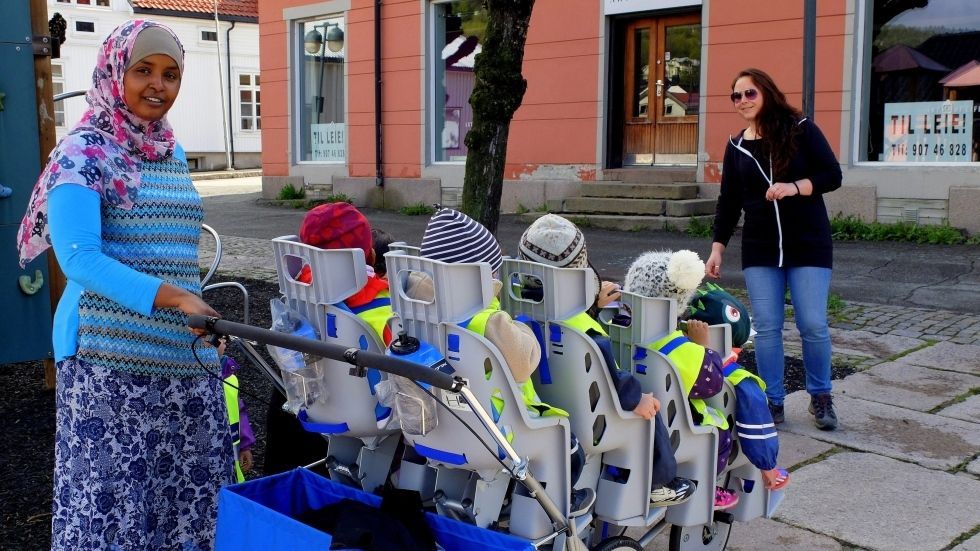
Own transport. To walk ride trolleys.
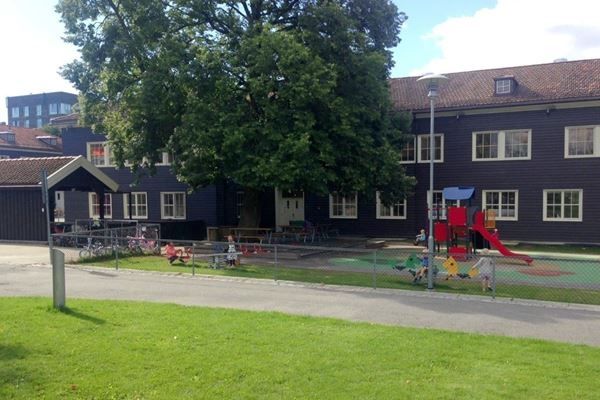
Modest and tasteful. All play together.
BULGARIA TO PARENTS OF MONEY DO NOT TAKE
Bulgarian gozzadini very similar to “our”, but here fundamentally don’t take money from parents. So they look quite modest. “The order of the day here, as we have, — says a resident of Sofia Irina Szyszkowska. But in groups of no more than 10 children. As soon as it gets cold out there on the street nobody walks. If you want the birthday child to bring a cake, it is necessary to show that he is “licensed”, that is, store-bought”. State garden is inexpensive — 48 BGN (720 UAH) per month, private, more expensive — from 300 leva (4500 UAH).
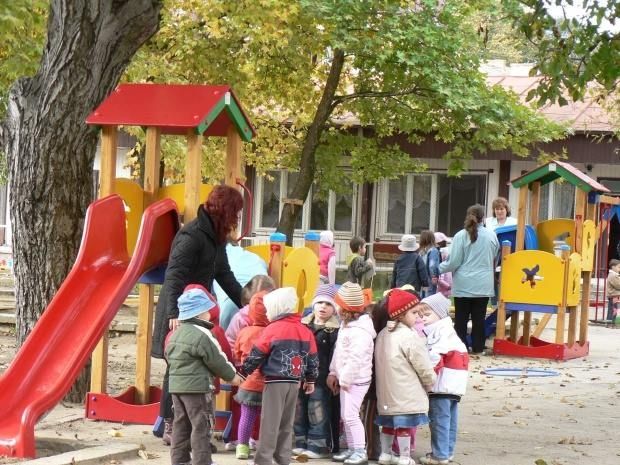
Similar to our own. When it’s cold, on the street does not walk.
ENGLAND: EXPENSIVE AND INDIFFERENT
Gardens there are fabulously expensive, state nurseries, no. So, Hassidic can cost 900 pounds (30 UAH 600) per month, in private one day costs £ 80 (2700 UAH). So many Brits trying to get out to 4 years, until the child goes to school: leave it to grandparents, are on duty at a time. But after 3 years there is the weekly 15 hours free for visiting the garden. “Food usually bring with them, and nobody cares what the child is eating hamburgers, chocolates and biscuits for lunch — says Julia Christian. — Bedrooms, as well as the mandatory quiet hours, no. If the baby is tired, he postest in the game on the floor. It’s not made to coddle the children: they go to jackets unbuttoned, no socks, etc. Also here are comfortable with the disease: low-grade fever, snot and cough is not a reason to skip school. Similar symptoms here, no one pays attention”.
GERMANY: ALL AGE GROUPS
Historically, the gardens of East and West Germany are different. In the East much more public gardens: there remained the base from the Soviet era. And they are absolutely free. As a rule, the group of about 10-12 children of different ages and two teachers. Then decided that the older children helped the younger — is that so they develop better. By the way, there’s absolutely I teach give the opportunity to enjoy childhood.
“At first glance, the group’s total anarchy — says a resident of Berlin Maria Kuznetsova. — Children gather in a “morning circle”, talking with a tutor, and then — no classes format “they all sat together at the table and all together put the mushrooms”.
Adult beckon to the table one or the other child, paint him, sculpt and so on. In the street play together, no separate areas for each group not provided. Often we go on trips, and not only in the Park and the museums, but also in various other places: to the hospital to work for my mom in the Laundry room, fire station, etc.
The dining room here is not provided: children lay the tables and then they clean up after themselves. A hot meal is only one meal. Sometimes the gardens are fed with fruits and snack, are sometimes asked to bring Breakfast with them. If your child has allergies or specific preferences, you are allowed to bring food from home, and to give the teachers — in lunch to heat it up. Bedrooms: after lunch, children are placed on mattresses, not on beds. To sleep in the quiet hours optional: quiet enough to lie down under the tale, and then you can get up and play quietly in the next room.”
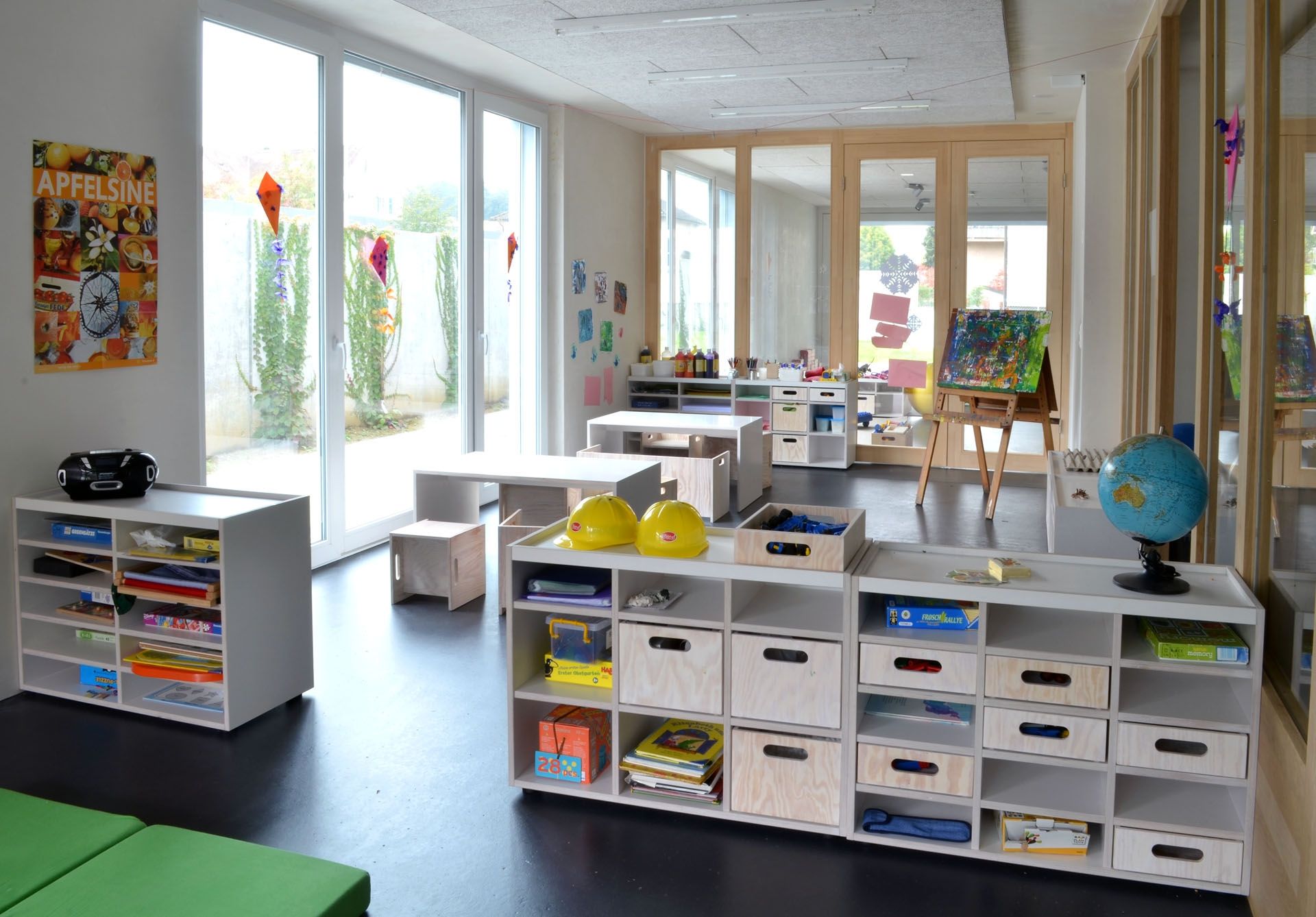
Teach independence. The interior contributes to this.
CHINA: THE GARDENS WITHOUT STEYN AND ONLINE
There are public and private kindergartens, and they are very different from each other. If the first is similar to Ukrainian, the second implemented the European approach. Hassidic costs about 300 yuan (1200 UAH) per month, private — about 1,500 yuan (6000 UAH).
“Children in kindergartens always somewhere to go and something to do, — says a resident of Beijing Yulia smal. — In China it is called “social activity”. For example, organized a school bus to go buy food. There are even special shops where children learn to do this. Can go to visit to another garden, play together, and a week — waiting for a return visit. An interesting feature of the kindergarten building: it is a system of open galleries, with a roof and handrails, but the walls are not provided here. Children constantly like on the street, in any temperature”.
The gardens are open until 16:00, despite the fact that most of the parents are open until 21:00. After this time you can leave the child in a special evening schools, but usually take children and grandparents.
To sit in the group not accepted: children disperses in the territory and does what he wants. Some bring with them the rollers or Bicycle and ride around the garden. Others paint or sculpt. The garden is protected, so this freedom is safe. By the way, each garden is a website where teachers post photos and videos of what the children are doing. All together collected only in the classroom. Calligraphy, English, math and reading are taught, even the little ones. The children sleep on cots, but they are of such design that add up one on one pyramid, and at night they spread out. In a nursery group is 14 children, following them for 3-4 persons: teachers and nurses.
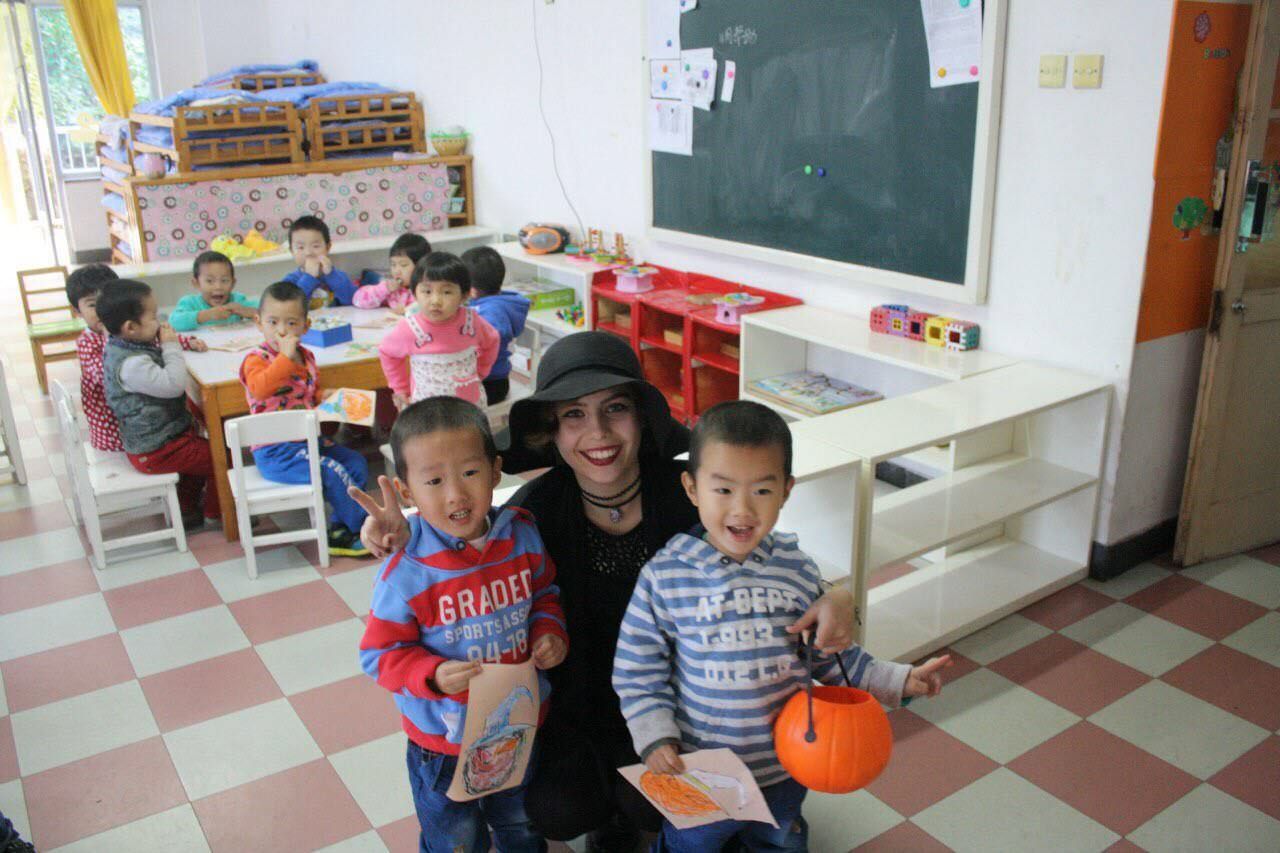
Control. Parents observe children via the Internet.
ICELAND: THE COMPULSORY “MOUSTACHED NURSES”
In Iceland with fertility everything is in order, the kindergartens are filled to 100%, so prospective parents are advised to record their child during pregnancy. On the website of urban services can be requested, which, in addition to information about the kid, you must specify three desired kindergarten (landmark — proximity to home). By submitting an entry, also indicate the estimated number of hours that the child will be in the garden depends on the cost. “We paid 7 hours a day. It 25 thousand kroons (6100 UAH) per month, — says a resident of Reykjavik Constantine Stroganov. — 15 thousand from them — the fee for time 10 thousand for the food. For large families, single mothers, students and the disabled discounts are available”.
In the kindergarten are all very modest and utilitarian. Groups are often combined, especially in winter, when many children are sick. They are placed in three equal-size rooms and are connected by a common corridor. In the halls of the children eat, sleep, and play. All eat at the same table, sleeping on mattresses. Beds and linens not: only cushions and blankets. “To underwear do not undress sleeping, what’s played, but if the clothing is soiled, change into clean indoor shoes. Sleep is not forced. If the child’s behavior it is clear that he can not sleep, its just withdrawn to another room. What I like is the opportunity to spend with my daughter in the garden all the time in the first days of adaptation. I could sit in the break room, read the newspaper, drink coffee or just be there. Knowing that Eva sleeps badly, I was allowed to pack her own. I went with her until she got used, — says Konstantin. — Another interesting detail: every garden must have at least one man around. In the autumn we had one young “moustached nurses”, which, among other things, and even played the guitar for the kids. When he went to another kindergarten, in its place immediately found another man, also with a guitar.”
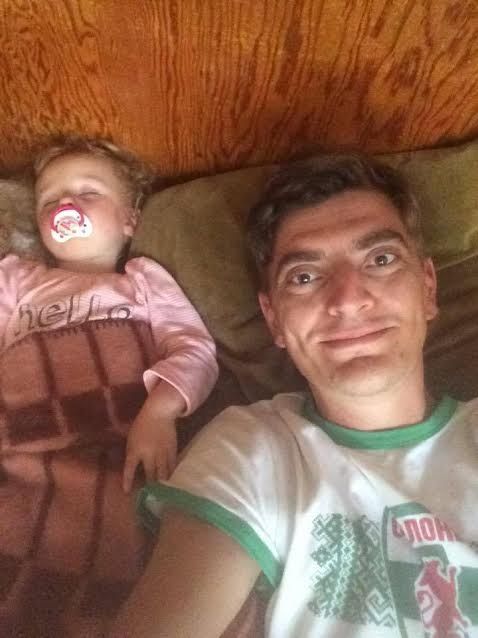
A quiet hour. Dad’s not scary.
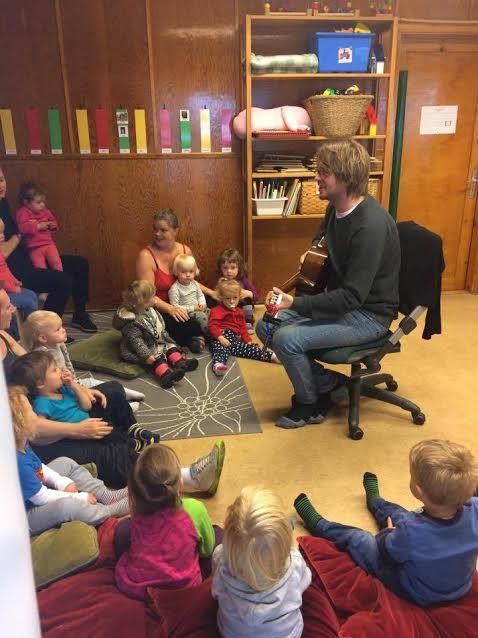
Thing. Music classes.
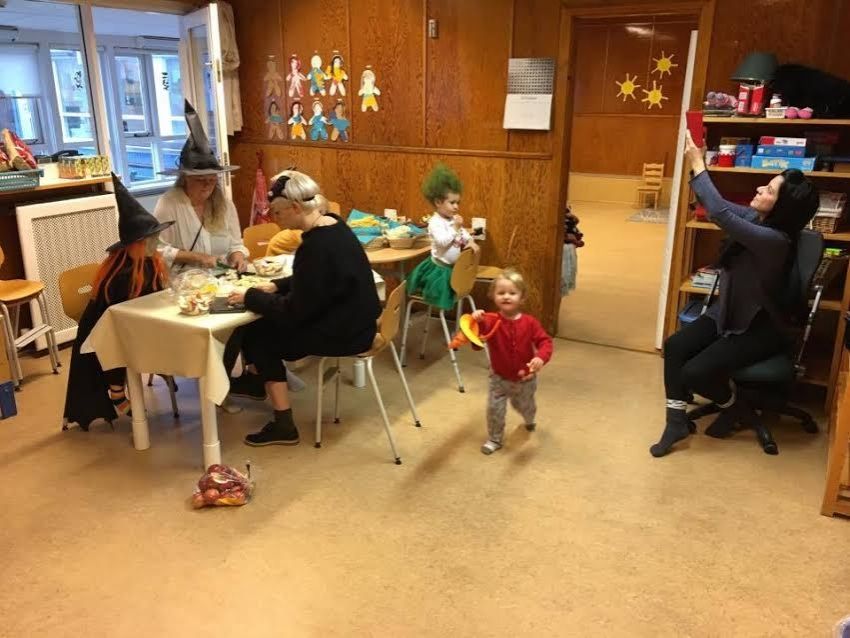
Preparation for Halloween. Parents participate.
SOUTH KOREA: MINI-GARDENS AT EVERY STEP
Large kindergartens there is no principle. But a lot of small, private, located within walking distance from the house. Sometimes every 50-100 meters there is a garden! They usually take 1-2 apartments on the ground floor, they also allocate a small area for walking.
Irina Gracheva from Korea, whose granddaughter went to this garden, said: “Everywhere in the garden — warm floors. Sleep on the mattress which after sleeping fold. Take children very young, from six months. For them their own room, which is not allowed by the older children. In the group, usually no more than four people. Usually the smallest meal brings mother and older kiddies prepares cook. For each child to make a separate album where the teacher is recording his every move: what time I woke up, ate, etc. during the day the teachers sent my mom photos and videos on the phone, so she knew how the child feels in the garden. Also everyone give personal backpacks that parents put a change of clothes, diapers, favorite toys. Older children are often selected in the “tours”: walking to the shops, library, museums. The staff here is very knowledgeable, and the kids are just a couple of weeks to get used to the new routine of life. Rekorajski mom’s no surprise that the children here never cry: teachers know how to take them, to entertain, so they very quickly get used to garden and go there with pleasure.”
Price nursery low: the first installment — about $ 100 (2900 UAH), children spend some registries and all other services are free. The fact that the child allowance, which is paid by the state, after the child goes to the garden list directly there. In the older groups only pay for the food.
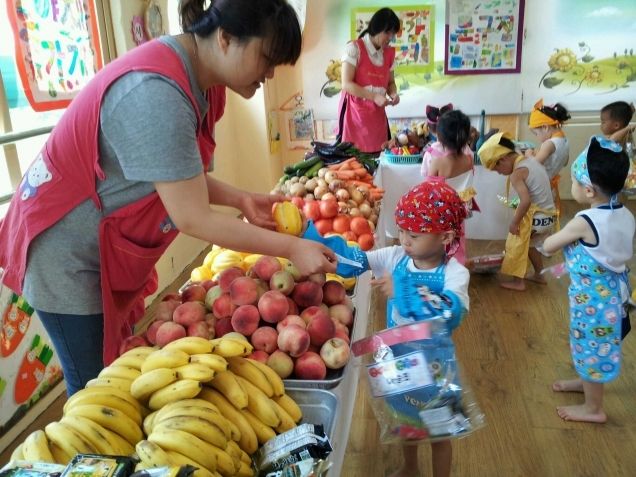
Educational “tours”. Children visit stores and museums.


